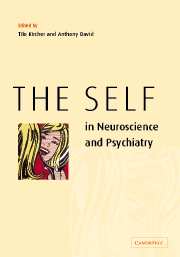Book contents
- Frontmatter
- Contents
- List of contributors
- Introduction: the self and neuroscience
- Part I Conceptual background
- 1 The self and psychiatry: a conceptual history
- 2 The self in philosophy, neuroscience and psychiatry: an epistemic approach
- 3 Phenomenology of self
- 4 Language and self-consciousness: modes of self-presentation in language structure
- Part II Cognitive and neurosciences
- References
2 - The self in philosophy, neuroscience and psychiatry: an epistemic approach
from Part I - Conceptual background
Published online by Cambridge University Press: 18 December 2009
- Frontmatter
- Contents
- List of contributors
- Introduction: the self and neuroscience
- Part I Conceptual background
- 1 The self and psychiatry: a conceptual history
- 2 The self in philosophy, neuroscience and psychiatry: an epistemic approach
- 3 Phenomenology of self
- 4 Language and self-consciousness: modes of self-presentation in language structure
- Part II Cognitive and neurosciences
- References
Summary
Abstract
The self and self-consciousness are investigated in such different disciplines as neuroscience, psychiatry and philosophy. The resulting theories of these investigations are as different as are these three sciences. This often leads to the question which of the theories should be considered as the best theory or even as the true theory.
However in this chapter we hold the opinion that none of the different theories is comprehensive in a way that covers all the questions brought up by the other disciplines. We think that this is due to the fact that the three different sciences start from different perspectives, namely the first-person perspective, second-person perspective and third-person perspective. Consequently their resulting theories cannot be regarded as an absolute truth, but only as true in the scope of their perspective.
In this chapter the different perspectives are characterized according to their epistemic limitations and abilities. Furthermore it is shown how these perspectives lead to characteristic implications concerning the theories of the self in the different sciences.
Introduction
The self and self-consciousness have always been important problems in philosophy, especially dealt with in the philosophy of mind (Gloy, 1998). However the recent philosophy of mind often refers to Descartes' theory as its beginning (Seager, 1999). His special methodology and his theses have deeply influenced many of his successors. Descartes begins with our reflective consciousness, which questions anything. It results in a fundamental doubt towards everything except the fact that we think or doubt, e.g. the consciousness or the mind does not doubt its own existence.
- Type
- Chapter
- Information
- The Self in Neuroscience and Psychiatry , pp. 40 - 55Publisher: Cambridge University PressPrint publication year: 2003
References
- 7
- Cited by

